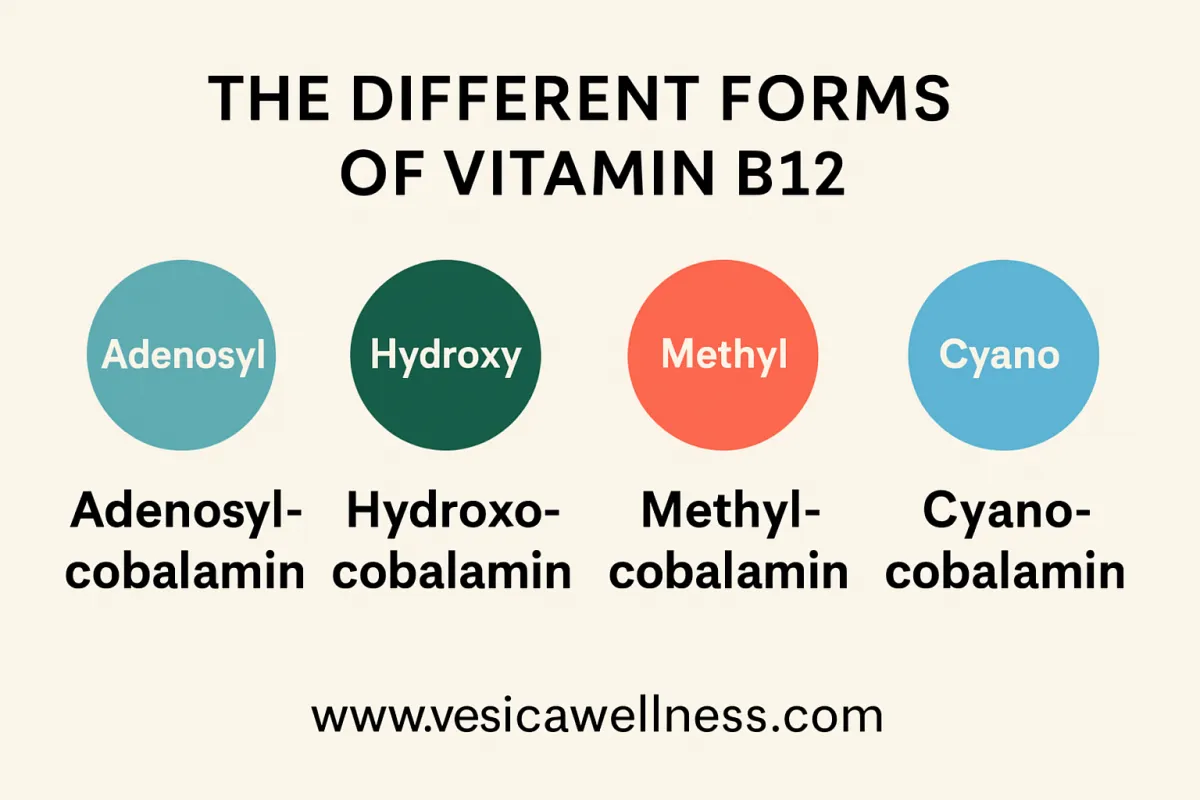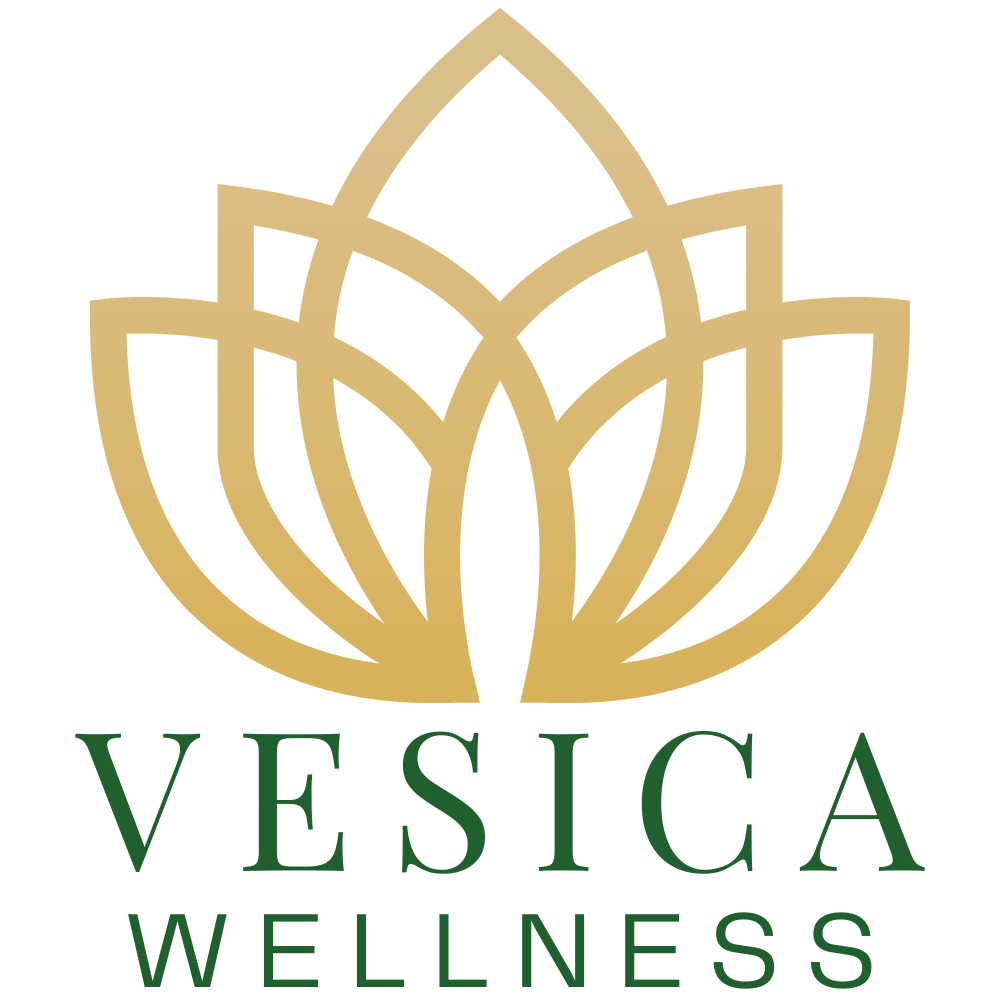
The B12 Type Comparison Guide: Methylcobalamin vs. Adenosylcobalamin vs Hyrdroxycobalamin
Vitamin B12 is one of those nutrients that’s both essential and deeply misunderstood. Many people know it supports energy, but fewer realize how crucial it is for DNA synthesis, methylation, nerve function, and detoxification. When B12 runs low, symptoms can appear in many forms: fatigue, brain fog, mood swings, memory loss, neuropathy, or even cardiovascular challenges.
But here’s where it gets more complex: B12 isn’t just one nutrient. There are multiple active and supplemental forms—each with unique roles and benefits in the body. Choosing the right form can make a noticeable difference, especially if you’re dealing with genetic variations (like MTHFR), chronic health issues, or detox challenges.
In this guide, we’ll break down the differences between the primary forms of B12—methylcobalamin, adenosylcobalamin, and hydroxocobalamin—plus touch on the less-discussed cyanocobalamin. You’ll learn how they work, who might benefit most from each, and how to make a wise choice for your health.
*Medical Disclaimer: This article is for educational purposes only and is not intended to diagnose, treat, cure, or prevent any disease. The information provided here should not replace professional medical advice, diagnosis, or treatment. Always consult with a qualified healthcare provider before starting or changing any supplement routine, especially if you have existing medical conditions, are pregnant or nursing, or are taking prescription medications.
Why Vitamin B12 Matters So Much
B12 is a water-soluble vitamin, meaning the body doesn’t store it in large amounts compared to fat-soluble vitamins like A, D, E, and K. Yet its responsibilities are profound:
Methylation support: B12 helps regulate homocysteine levels, protect DNA, and turn genes “on” or “off” appropriately.
Energy production: It’s a key player in mitochondrial health, the tiny “power plants” inside every cell.
Neurological protection: B12 is necessary for myelin, the protective sheath around nerves.
Detoxification: It plays a role in recycling glutathione, the body’s master antioxidant.
Without enough B12, the body struggles to keep up with everyday demands.
The Main Forms of B12
1. Methylcobalamin (Methyl B12)
Methylcobalamin is the active, methylated form of B12 that directly participates in methylation pathways. If you’ve heard of the MTHFR gene, this is the form most often discussed, since people with methylation challenges may need pre-methylated nutrients.
Key Benefits:
Supports healthy methylation, which is crucial for detox, neurotransmitters, and mood balance.
Lowers homocysteine (linked to cardiovascular health).
Often recommended for people with MTHFR gene variants.
Directly bioavailable—ready for the body to use without conversion.
Best For:
People with methylation issues.
Those dealing with depression, anxiety, or mood imbalances.
Individuals with cardiovascular risk factors or elevated homocysteine.
Things to Note:
Some sensitive individuals (or "overmethylators) may feel “overstimulated” if they take too much methyl B12 at once. This doesn’t mean it’s harmful—it just means dosing and balance with other cofactors matter. If methyl B12 leads to anxiety, nervousness, etc., you may consider adenosylcobalmin as a option as it doesn't force as many methyl groups through the metabolic chain.
2. Adenosylcobalamin (Adeno B12)
Adenosylcobalamin is the mitochondrial form of B12. While methylcobalamin works in the cytoplasm (the cell fluid), adenosylcobalamin works inside the mitochondria to support energy metabolism.
Key Benefits:
Vital for mitochondrial energy production (Krebs cycle).
Supports nerve health and helps prevent neuropathy.
May be especially important for people with fatigue, mitochondrial disorders, or neurological conditions.
Best For:
Athletes and those seeking improved energy production.
People with chronic fatigue or mitochondrial dysfunction.
Neurological health, including those with tingling, numbness, or balance concerns.
Things to Note:
Adenosylcobalamin is less common in standalone supplements; it’s often combined with methyl B12 in high-quality formulas.
3. Hydroxocobalamin (Hydroxy B12)
Hydroxocobalamin is a natural form of B12 produced by certain bacteria. Unlike methyl and adenosyl, it’s not directly active—it must be converted in the body. But that’s not a drawback; it can actually make hydroxy B12 an ideal choice for certain people. That means that this form may be the best choice if you are sensitive to methyl B12.
Key Benefits:
Longer half-life in the body than other forms.
Useful for people sensitive to methyl groups (overmethylators).
Often used in injections for treating B12 deficiency.
Binds nitric oxide, which may benefit individuals with oxidative stress or “detox crashes.”
Best For:
Individuals sensitive to methyl donors.
Those with difficulty regulating detox or experiencing anxiety from methyl B12.
People needing a steady, longer-lasting B12 supply.
Things to Note:
Since it requires conversion, those with very poor B12 metabolism may do better with methyl or adenosyl directly.
4. Cyanocobalamin
Cyanocobalamin is the synthetic form of B12 often found in cheap supplements or fortified foods. While it can prevent deficiency, it’s not naturally occurring and must be converted into active forms.
Key Benefits:
Inexpensive and widely available.
Effective at preventing outright B12 deficiency.
Drawbacks:
Contains a cyanide molecule that must be detoxified (tiny amount, but unnecessary).
Less efficient conversion compared to other forms.
Not ideal for those with methylation challenges or chronic illness.
Best For:
Situations where cost is the only factor.
Short-term use when better forms aren’t available.
How to Choose the Right B12 for You
Different people may respond differently depending on their genetics, health status, and current nutrient balance. Here’s a simplified way to think about it:
Methylcobalamin: If you struggle with mood, homocysteine, or methylation (MTHFR), and you are NOT an overmethylator (usually this is due to slow comt and/or low MAO-B genes), start here.
Adenosylcobalamin: If your main issue is energy, mitochondria, or nerve pain, consider this form.
Hydroxocobalamin: If you feel “wired” or anxious from methyl B12, or want a longer-acting option, hydroxy is often better. Often the best form for overmethylators that experience negative effects from methylcobalamin.
Combination Formulas: Many of the best supplements now combine methyl + adenosyl (sometimes with hydroxy), giving the body multiple pathways to use what it needs.
Practical Tips for Supplementing with B12
Sublingual or Liposomal Forms Work Best – Since B12 absorption in the gut can be poor (especially if you have low stomach acid or intrinsic factor issues), sublingual drops, lozenges, or liposomal liquids are usually more effective.
Pair with Folate and Cofactors – B12 doesn’t work alone. It functions in harmony with folate (especially folinic acid or methylfolate), B6, magnesium, and even minerals like potassium.
Start Low, Go Slow – If you’re sensitive to methyl donors, begin with hydroxy or adenosyl and introduce methyl gradually.
Check Your Labs – Markers like serum B12, methylmalonic acid (MMA), and homocysteine can help determine how your body is using B12. Functional practitioners may also use organic acid testing.
The Bigger Picture: B12 and Whole-Body Health
B12 is more than just “energy in a pill.” It’s a cornerstone nutrient that supports your genetic expression, detox pathways, nervous system, and mitochondrial health. Whether you’re seeking sharper focus, balanced mood, or long-term vitality, choosing the right form of B12 can make a real difference.
At Vesica Wellness, we believe that supplements should be chosen not just for “what’s popular” but for what helps you align with God’s design for health and wholeness. That means using the highest quality raw materials, avoiding unnecessary additives, and formulating with care.
If you’re considering B12 supplementation, it’s not just about avoiding deficiency—it’s about optimizing the form that best nourishes your body and purpose.
Final Thoughts
Methylcobalamin, adenosylcobalamin, hydroxocobalamin, and even cyanocobalamin all serve as different “keys” to unlock health in the body. The right key for you depends on your unique genetics, metabolism, and health goals. Many people benefit from a blend of methyl + adenosyl, while others find hydroxy to be a gentler, more stable option.
Instead of a “one-size-fits-all” approach, the best path is an informed one—backed by understanding, self-awareness, and when possible, testing.




